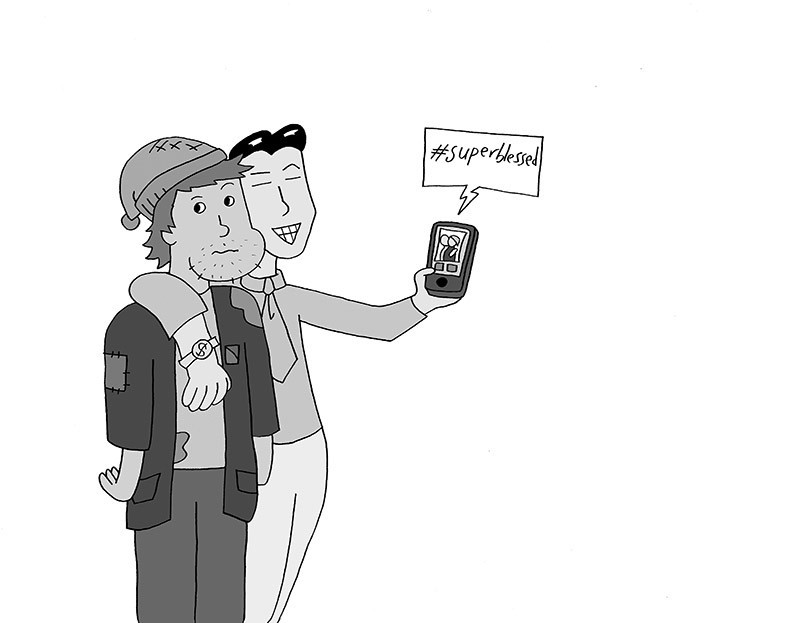Selfie-love
New Winnipeg app Posi’s ad campaign is anything but positive
The scene opens with a well-dressed man leaving his office. As he steps out onto the street, he encounters someone lying on the sidewalk, socked feet exposed to the winter elements. The man pauses for a moment, perhaps contemplating the injustice of homelessness in a society with more than enough resources to care for all its citizens. Inspired to make a difference, he heads to the shoe store where he grabs a pair of Sorel boots and charges it to his card. He returns to the homeless man, brandishing this gift and instructing him to pose for a selfie, which is then uploaded to a social media site. We see various beautiful people connected to the site picking up their phones to witness this great act of generosity and have their faith in humanity restored. Later on, our benevolent hero goes to buy a coffee and his money is refused by the barista, who has just seen the post and knows that this man is a selfless giver who deserves to be rewarded. Everyone feels great; end scene.
This is a promotional video for a new app, Posi, created by two men in Winnipeg who thought that the social media world needed a safe space where users could share “meaningful content” and inspire others to have a more positive outlook on the world. The app does not enable comments, giving users the confidence to post content without the fear of being judged or criticized publicly by others. The more that people share content, the more they contribute to a “positivity ring” associated with their avatar. The creators of Posi label the app a “social movement” and invite us to join them in “changing the world”.
The video and associated app have garnered some praise from people who can’t see the harm in something that simply aims to spread happiness and positivity around the world. However, some observers have reacted with frustration and disgust to the video and its implied message. To begin with, homeless people are not props. They do not exist to be exploited in our quest for affirmation or sense of self-worth. It is clear that the homeless person portrayed in the video is probably an actor and not actually homeless, but the effect of this portrayal needs some attention. First, it contributes to a widely held perception of homeless people as passive recipients of charity and second, it presents individual acts of charity as both an accepted and celebrated response to the experience of homelessness. The power imbalance between the grateful homeless and the privileged giver is evident. This representation (like many, many similar campaigns/ads/events etc.) influences how our society addresses social issues through the continued dismissal of basic Human Rights and erasure of the structural and systemic roots of injustice, supporting the withdrawal of responsibility on the part of our government to address poverty. The fact that in our wealthy nation we have people sleeping on the street points to our collective failure as a society, a fact that can be hard to face and may leave some feeling hopeless or at a loss about what we as individuals can do to make a difference.
The tendency to want to create islands of positivity in what can seem like a bleak world is understandable, but the reality is that being positive will not change the world, as the creators of Posi would like us to believe. Unfortunately, what we need is anger. We should be outraged when we see someone sleeping on the street. We need to stop fetishizing people’s lived experiences of material poverty and instead stand with those who are working for social justice by advocating for things like social housing and living wages. The people who are truly inspiring are the millions who experience poverty, stigmatization and marginalization daily and still fight tirelessly to improve society for everyone -- not for recognition or self-congratulation but because it is necessary.
The challenge of making critical observations about seemingly well-intentioned efforts is the tendency of others to accuse me of being too negative or point to other, more terrible things happening in the world that are more deserving of attention. The problem with things like the promotional video for Posi, another rather benign-seeming social media platform, is that it is in fact reinforcing the expectation that social change can be brought about through individual acts of kindness. The way that this belief manifests itself in how we allow our society to be structured is what holds us back from finding justice. Real social change comes through struggle and dialogue. It won’t always make us feel warm and fuzzy or provide a nice photo op.
This isn’t negativity; it is a demand for us to do better.
Jenna Drabble is a Graduate Student at the University of Manitoba.
Published in Volume 68, Number 26 of The Uniter (May 7, 2014)







